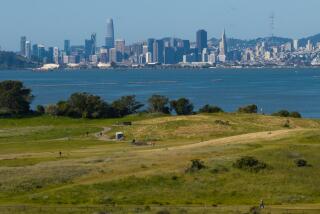BREA : Neighboring Cities Veto Park Restaurant
- Share via
Opposition from the Fullerton and Placentia city councils has virtually killed plans to build a restaurant in Tri City Park that had the support of the city of Brea.
The 40-acre park, which is actually within the city of Placentia, is managed by the three cities. A proposal such as one to develop a restaurant must be supported by at least two of the cities.
Brea Councilman Wayne Wedin said the dissenting cities are missing out on a rare opportunity to get the land for the restaurant.
The park is supported through federal funds, and commercial development of any portion within its boundaries is allowed only when an equal amount of land can be added to the park.
Unocal, which owns the Imperial Golf Course adjacent to Tri City Park, plans to develop its property into a residential neighborhood. Wedin said he is confident that Unocal, which must receive approval for the development from both Brea and Fullerton, would agree to deed to the park authority the two acres required by federal guidelines.
Because there is no other adjacent property that would be suitable for park use, the Unocal property represents the only opportunity for fulfilling the federal requirement, he said.
“All Brea asked was, ‘Should we look into this opportunity?’ ” Wedin said.
Fullerton Councilwoman Molly McClanahan, who also serves on the Tri City Park Authority, said the authority put out an invitation for restaurant proposals in 1987 but received no response.
“It was worth exploring once and we did,” she said.
McClanahan said Fullerton was also concerned that asking Unocal to donate land might jeopardize negotiations between Fullerton and Unocal on development of the golf course property.
The concept of a restaurant at Tri City Park is an old one. An artist’s rendering of the master plan shows a red circle designating a future restaurant site in the park’s northeast corner.
Wedin was Brea’s city manager when the restaurant was included in the master plan about 10 years ago. At that time, all three cities supported the idea of a commercial activity consistent with the park that would generate income for park maintainance.
What was envisioned for the site was a “family-oriented supper house” overlooking the lake in the center of the park. The site is now a grassy area that receives little use, Wedin said.
Wedin, who also works as an assets management consultant for various public agencies, said commercial use of public property is becoming a popular way for cities to raise money without taxing its residents.
More to Read
Sign up for Essential California
The most important California stories and recommendations in your inbox every morning.
You may occasionally receive promotional content from the Los Angeles Times.










